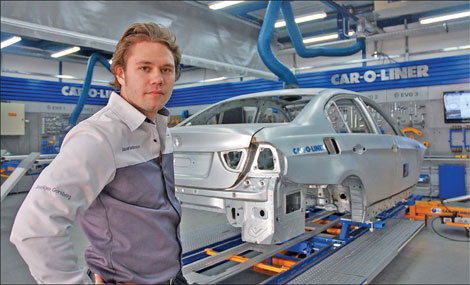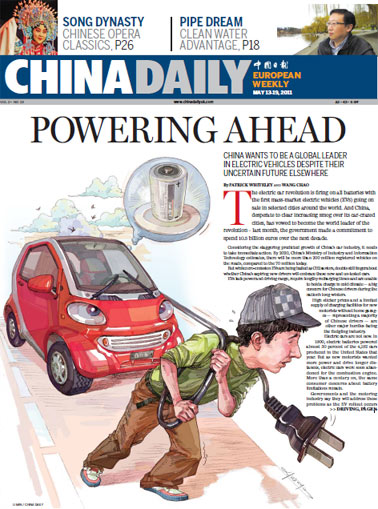Body of work
Updated: 2011-05-13 11:32
By Alexandra Leyton Espinoza (China Daily European Weekly)
 |
|
Joakim Gorsberg is considered one of the best young panel beaters in Sweden after winning a national work skills competition. Alexandra Leyton Espinoza / For China Daily |
Swede passes on repair skills to budding local mechanics
Expert smash repair mechanic Joakim Gorsberg has more than enough to do in a city of 4.5 million automobiles and a legion of new, inexperienced, accident-prone drivers. For more than two years the young Swede has been enjoying his job in Beijing as an after sales and support manager at Car-O-Liner, a company that provides collision repair systems for cars.
However, unlike many expats in China who relish the experience, at first Gorsberg wasn't overly keen about any Asian adventure.
"My first reaction was, 'No way' when I was offered a job as an academy trainer for Car-O-Liner," he says. "I had been to the south of China once before and didn't like it at all. But a former school teacher had a great influence on my decision, and told me I had nothing to lose, and that I should try it out."
So in 2009, at the age of 22, he packed his bags and moved to Beijing.
For more than 30 years, Swedish company Car-O-Liner has supplied the automotive industry with collision repair systems.
There are some 45,000 Car-O-Liner collision repair systems in use worldwide, and in China the company offers training in Beijing, Shanghai and Guangzhou for repairing Volvo, Nissan and BMW cars.
Gorsberg's first task was to teach the trainers, who were mostly designers and engineers with good theoretical knowledge, but no experience in body repairing.
"In the beginning I was the practical trainer, and taught trainers in English, and they later trained their panel beaters in Chinese," he says.
The trainers learned a lot. Some had never held a welding torch before.
Despite his youth, Gorsberg is counted as one of the best-qualified panel beaters in Sweden.
He was raised in his grandfather's garage and is a third-generation panel beater. In 2006, he won the Youth Skills Sweden Cup, a competition for vocational education and training and achieved the best place Sweden had ever recorded in the World Skills competition the following year in Japan.
Car-O-Liner had its eyes on him for quite a while and sponsored him in the competition.
Jan Roos, management director at Car-o-Liner in China, explains the reason why the company decided to hire such a young man like Gorsberg to be a part of its China business.
"We needed to increase knowledge in our hands-on quality in our academy courses," she says. "To be a panel beater is not just mechanics and theory, you must also have the correct disposition.
"We saw lot of potential in Joakim and we wanted him to advance further with these qualities.
"Eight months later we called Gorsberg and asked if he was interested in moving to China and work for them."
Gorsberg says panel beating is a new industry in China because of the nation's short motoring history.
"It takes generations to pass the knowledge of good sheet metal work on," he says. "If you have a student that has learned theory for two years and his teacher was a shoemaker 20 years ago, of course, he will not be able to teach him to be a good mechanic.
"These sort of skills take time, but I must say I am impressed by how fast the Chinese learn."
He settled on a one-year contract that gave him his own apartment in Beijing, a competitive salary but most important of all, a big chance to develop skills he didn't think he had.
"I have learned how to take initiatives, be more social, give directions and be better at managing the computer system that's an important part of our job," he says.
But even though he enjoyed his new job, he still found life in China, in the beginning, awkwardly different. He had moved from a small city in Sweden to a metropolis of 20 million and the new impressions were overwhelming. Not to mention the language barrier.
"The first three months were hard. I didn't have many friends and couldn't speak any Chinese. I found the traffic too much, the people and culture so different," he says.
A membership at the Swedish Young Professionals, a sub-group to the Swedish Chamber of Commerce, introduced him to new people and he soon settled into his new Chinese home.
"I have a social life that is so much richer from the one in Sweden," he says. "I can afford to go out, have fun with my friends and still save some money. In Sweden you have a 8-5 job and on weekends you go out for a beer and that's all."
So when he was offered a new contract he said yes. but this time with more responsibilities. He now writes reports, assist sellers with suggestions on products that customers might need and still teaches trainers to better understand the skills required to repair damaged cars.
"A large part of my job is to increase the quality of the workmanship," he says. "If you repair a car the wrong way, it can be a matter of life and death.
"Everyone here knows that Volvo is one of the safest cars in the world but very few know why. I tell them it is because of the quality of steel used to make the car.
"But if you don't repair it according to Volvo's original equipment manufacturer (OEM) standards, than the brand name doesn't mean anything."
According to Gorsberg, one of the major reasons why cars in China are not repaired as well as they are in Europe is because Chinese insurance companies do not appreciate the importance of following the instruction manuals.
He says to repair a car properly takes time and money, but if the insurance company says no to high costs, a workshop may rush the work.
"In Sweden it's different because the insurance companies pay the price. They understand how important it is to get it right," he says.
Two years after moving to the world's most populous nation, Gorsberg has fully settled into the Chinese capital. He is now cashier for the Swedish Young Professionals, a manager at his company and has just upgraded to a new apartment closer to Beijing's pulsating nightlife.
"I love my job and I am so glad that I made the decision to stay," he says. "I don't have a plan for the future. I live for today because who knows what will happens next."
E-paper

Green works
Wuxi becomes 'test case' for facing country's environmental challenges
The global rise of Chinese brands
China-EU trade on solid ground
ZTE banks on innovation
Specials

The song dynasty
There are MORE THAN 300 types of Chinese operas but two POPULAR varieties are major standouts

Cut above the rest
One of the world's oldest surgeons has performed more than 14,000 operations

From the ground up
Architect of Guangzhou Opera House has many projects under way, including 2012 Olympics.
